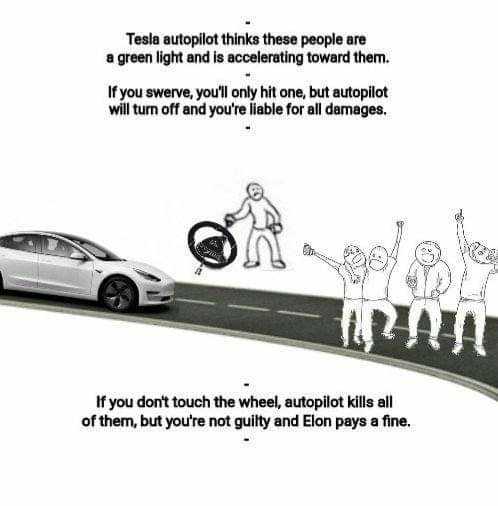view the rest of the comments
Fuck Cars
This community exists as a sister community/copycat community to the r/fuckcars subreddit.
This community exists for the following reasons:
- to raise awareness around the dangers, inefficiencies and injustice that can come from car dependence.
- to allow a place to discuss and promote more healthy transport methods and ways of living.
You can find the Matrix chat room for this community here.
Rules
-
Be nice to each other. Being aggressive or inflammatory towards other users will get you banned. Name calling or obvious trolling falls under that. Hate cars, hate the system, but not people. While some drivers definitely deserve some hate, most of them didn't choose car-centric life out of free will.
-
No bigotry or hate. Racism, transphobia, misogyny, ableism, homophobia, chauvinism, fat-shaming, body-shaming, stigmatization of people experiencing homeless or substance users, etc. are not tolerated. Don't use slurs. You can laugh at someone's fragile masculinity without associating it with their body. The correlation between car-culture and body weight is not an excuse for fat-shaming.
-
Stay on-topic. Submissions should be on-topic to the externalities of car culture in urban development and communities globally. Posting about alternatives to cars and car culture is fine. Don't post literal car fucking.
-
No traffic violence. Do not post depictions of traffic violence. NSFW or NSFL posts are not allowed. Gawking at crashes is not allowed. Be respectful to people who are a victim of traffic violence or otherwise traumatized by it. News articles about crashes and statistics about traffic violence are allowed. Glorifying traffic violence will get you banned.
-
No reposts. Before sharing, check if your post isn't a repost. Reposts that add something new are fine. Reposts that are sharing content from somewhere else are fine too.
-
No misinformation. Masks and vaccines save lives during a pandemic, climate change is real and anthropogenic - and denial of these and other established facts will get you banned. False or highly speculative titles will get your post deleted.
-
No harassment. Posts that (may) cause harassment, dogpiling or brigading, intentionally or not, will be removed. Please do not post screenshots containing uncensored usernames. Actual harassment, dogpiling or brigading is a bannable offence.
Please report posts and comments that violate our rules.

The Trolley problem is a schoolbook example of the failure of creed-based philosophy (deontological ethics), but is also used (the various scenarios) to illustrate that circumstances that don't affect the basic scenario or outcome do affect our feelings and our response to the scenario.
It's easier to pull a lever from a remote position than to actually assault someone or kill them by your own hand, for example.
There are other scenarios that don't necessarily involve trolleys, but involve the question of doing a wrongful act in order to produce a better outcome. Ozymandias in The Watchman killing millions of New Yorkers to prevent a nuclear exchange, thereby saving billions of people. (Alan Moore left it open ended whether that was the right thing to do in the situation, but it did have the intended outcome.)
We like the trolley problem because you can draw it easily on the blackboard, but other situations are much better at illustrating how subtle nuance can drastically change the emotions behind it.
Try this one:
The Queen of the land dies. On the day of her sister’s coronation, she declares that Anglicanism is now the faith and Catholics are now unlawful — a reversal of the old order — Catholics are to report to a town or city hall to convert or be executed. You are Catholic. Do you obey the law or flee? And if you obey the law, do you convert or perish at the hand of the state? Do you lie about your faith to state agents or to the national census?
To a naturalist like myself, I'm glad to lie or convert to spare my own life, but to the devout, pretending to be another faith, or converting by force was a terrible sin, so it's a very sober (and historically relevant) look at religious principle.